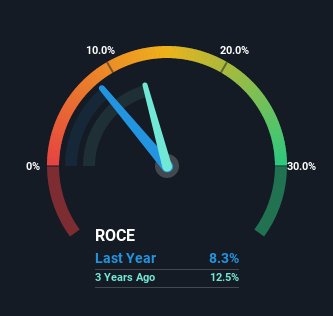- United Kingdom
- /
- Food
- /
- LSE:ABF
Returns On Capital At Associated British Foods (LON:ABF) Paint A Concerning Picture

Did you know there are some financial metrics that can provide clues of a potential multi-bagger? Ideally, a business will show two trends; firstly a growing return on capital employed (ROCE) and secondly, an increasing amount of capital employed. If you see this, it typically means it's a company with a great business model and plenty of profitable reinvestment opportunities. Although, when we looked at Associated British Foods (LON:ABF), it didn't seem to tick all of these boxes.
What is Return On Capital Employed (ROCE)?
Just to clarify if you're unsure, ROCE is a metric for evaluating how much pre-tax income (in percentage terms) a company earns on the capital invested in its business. The formula for this calculation on Associated British Foods is:
Return on Capital Employed = Earnings Before Interest and Tax (EBIT) ÷ (Total Assets - Current Liabilities)
0.083 = UK£1.2b ÷ (UK£18b - UK£3.3b) (Based on the trailing twelve months to March 2022).
So, Associated British Foods has an ROCE of 8.3%. Ultimately, that's a low return and it under-performs the Food industry average of 11%.
View our latest analysis for Associated British Foods

In the above chart we have measured Associated British Foods' prior ROCE against its prior performance, but the future is arguably more important. If you'd like to see what analysts are forecasting going forward, you should check out our free report for Associated British Foods.
What Does the ROCE Trend For Associated British Foods Tell Us?
In terms of Associated British Foods' historical ROCE movements, the trend isn't fantastic. To be more specific, ROCE has fallen from 13% over the last five years. However, given capital employed and revenue have both increased it appears that the business is currently pursuing growth, at the consequence of short term returns. If these investments prove successful, this can bode very well for long term stock performance.
What We Can Learn From Associated British Foods' ROCE
In summary, despite lower returns in the short term, we're encouraged to see that Associated British Foods is reinvesting for growth and has higher sales as a result. These growth trends haven't led to growth returns though, since the stock has fallen 38% over the last five years. So we think it'd be worthwhile to look further into this stock given the trends look encouraging.
One more thing, we've spotted 1 warning sign facing Associated British Foods that you might find interesting.
For those who like to invest in solid companies, check out this free list of companies with solid balance sheets and high returns on equity.
New: Manage All Your Stock Portfolios in One Place
We've created the ultimate portfolio companion for stock investors, and it's free.
• Connect an unlimited number of Portfolios and see your total in one currency
• Be alerted to new Warning Signs or Risks via email or mobile
• Track the Fair Value of your stocks
Have feedback on this article? Concerned about the content? Get in touch with us directly. Alternatively, email editorial-team (at) simplywallst.com.
This article by Simply Wall St is general in nature. We provide commentary based on historical data and analyst forecasts only using an unbiased methodology and our articles are not intended to be financial advice. It does not constitute a recommendation to buy or sell any stock, and does not take account of your objectives, or your financial situation. We aim to bring you long-term focused analysis driven by fundamental data. Note that our analysis may not factor in the latest price-sensitive company announcements or qualitative material. Simply Wall St has no position in any stocks mentioned.
About LSE:ABF
Associated British Foods
Operates as a diversified food, ingredients, and retail company worldwide.
Flawless balance sheet, undervalued and pays a dividend.


